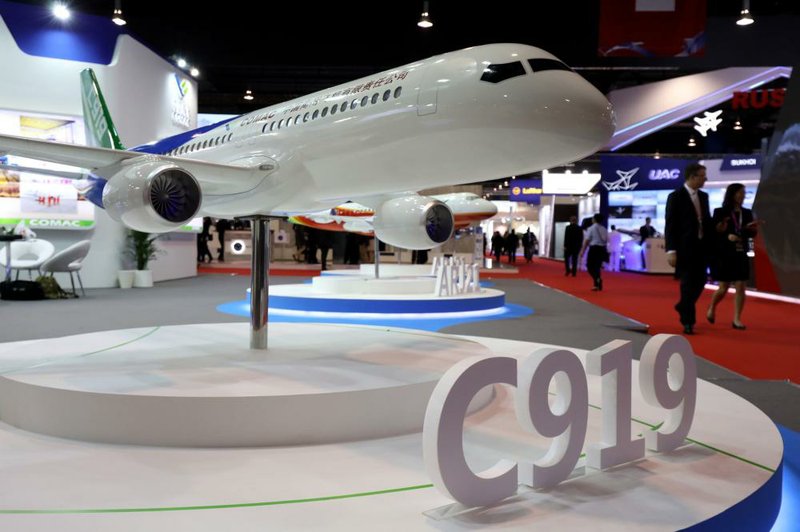WASHINGTON -- President Donald Trump publicly objected Tuesday to efforts within his own administration to restrict the sales of U.S. technology to China because of national security concerns, insisting that such fears are an "excuse" and that the United States is open for business.
The comments, posted on Twitter, appeared to represent a striking reversal of the Trump administration's aspirations to curb China's ascent as a global leader in technology and came as Cabinet officials were scheduled to meet later this month to discuss restrictions on China.
Trump's tweets followed a report in The Wall Street Journal that his administration was weighing a ban on shipments to China of a jet engine produced jointly by General Electric and the French company Safran SA.
The Feb. 28 meeting was expected to include a discussion about whether to block GE's license to export the engine technology. Officials were also expected to consider new rules that would further curtail Chinese telecommunications giant Huawei's access to U.S. technology.
But Tuesday, Trump seemed to preemptively scuttle such moves, and two people familiar with the matter said the meeting was on hold and that the U.S. would not block GE's sales.
"The United States cannot, & will not, become such a difficult place to deal with in terms of foreign countries buying our product, including for the always used National Security excuse, that our companies will be forced to leave in order to remain competitive," Trump wrote. "We want to sell product and goods to China and other countries."
The president went on to say that if the United States does not sell its products for national security reasons, then other countries will step in and do so. Trump explicitly referenced the jet engine sales.
"As an example, I want China to buy our jet engines, the best in the World," he said. "I have seen some of the regulations being circulated, including those being contemplated by Congress, and they are ridiculous."
Trump said he has made this sentiment clear to everyone in his administration.
The Commerce Department declined to comment. The White House did not immediately respond to requests for comment.
China is using the engines to develop its own airliner, Comac C919, to compete with Boeing and Airbus. According to the Journal report, U.S. officials worry that Beijing could reverse-engineer the engine and enter the jet engine market. Another goal of the U.S. proposal reportedly is to slow development of the Comac airliner.
The administration's efforts to restrict the flow of U.S. technology to China has increasingly triggered objections from companies, who say it undermines their ability to compete on a global scale. Firms say they have already taken steps to limit the U.S. components in their products and may begin to do more research and development outside the United States.
General Electric, in response to media reports Saturday about the administration's review of its export license, said in a statement that it would comply with any requirements imposed by the United States but downplayed concerns about the risks of sales to China.
"We aggressively protect and defend our intellectual property and work closely with the U.S. government to fulfill our responsibilities and shared security and economic interests," the company said in a statement. "GE has provided products and services in the global marketplace for decades."
Geng Shuang, spokesman for China's foreign ministry, criticized the U.S. proposal to halt the jet engine deliveries during a news conference Tuesday.
"It would expose certain U.S. officials' ignorance in science and technology, disregard of the market principle, and anxiety with China's development," he said during a briefing. "It will be another example of the U.S. using political means to undermine bilateral commercial cooperation and wantonly oppress China."
Trump's description of national security as an "excuse" for interfering in international commerce is surprising given the president's decision to routinely link economic and national security. The president has cited the need to protect national security in his decision to impose tariffs on foreign metals and to consider placing them on foreign autos. The U.S. has also cited national security in expanding its ability to block international mergers and acquisitions.
The shift in position is also notable given the administration's ongoing efforts to crack down on Huawei, the Chinese telecom giant that is on a government blacklist. Administration officials were expected to further restrict U.S. sales to Huawei by closing a loophole that has allowed U.S. sales to continue. While the Pentagon initially opposed the effort, fearing that it could hurt defense suppliers, it has now reversed its position amid pressure from other administration officials.
John Neuffer, president and chief executive of the Semiconductor Industry Association, welcomed the administration's shift in tone.
"We applaud President Trump's tweets supporting U.S. companies being able to sell products to China and opposing proposed regulations that would unduly curtail that ability," he said in a statement. "As we have discussed with the administration, sales of nonsensitive, commercial products to China drive semiconductor research and innovation, which is critical to America's economic strength and national security."
Information for this article was contributed by Alan Rappeport of The New York Times and by Paul Wiseman of The Associated Press.
Business on 02/19/2020
